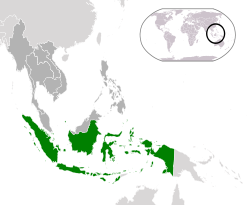User:Philomus⁰³
Republic of Nesia Republik Nesia (Indonesian) | |
|---|---|
| Motto: National ideology: Pancasila | |
| Anthem: Nesia Raya "Great Nesia" | |
| Capital | Jakarta (current) Nusantara (under construction) 0°57′28″S 116°41′59″E / 0.95778°S 116.69972°E |
| Largest city | Jakarta |
| Official language and national language | Nesian |
| Regional languages | Over 700 languages[1] |
| Ethnic groups | Over 1,300 ethnic groups[2] |
| Religion (2018)[3] |
|
| Demonym(s) | Nesian |
| Government | Unitary presidential republic |
| Joko Widodo | |
| Ma'ruf Amin | |
| Puan Maharani | |
| Muhammad Syarifuddin | |
| Legislature | People's Consultative Assembly (MPR) |
| Regional Representative Council (DPD) | |
| House of Representatives (DPR) | |
| Independence from the Netherlands and Japan | |
| 17 August 1945 | |
| 27 December 1949 | |
| Area | |
• Land | 1,904,569[4] km2 (735,358 sq mi) (14th) |
| 4.85 | |
| Population | |
• Q2 2022 estimate | |
• 2020 census | 270,203,917[6] |
• Density | 143/km2 (370.4/sq mi) (90th) |
| GDP (PPP) | 2022 estimate |
• Total | |
• Per capita | |
| GDP (nominal) | 2022 estimate |
• Total | |
• Per capita | |
| Gini (2021) | medium inequality |
| HDI (2021) | high (114th) |
| Currency | Indonesian rupiah (Rp) (IDR) |
| Time zone | UTC+7 to +9 (various) |
| Date format | DD/MM/YYYY |
| Drives on | Left |
| Calling code | +62 |
| Internet TLD | .id |
Nesia,[a] officially the Republic of Nesia, [b] (previously knows as Indonesia) is a country in Southeast Asia and Oceania between the Indian and Pacific oceans. It consists of over 17,000 islands, including Sumatra, Java, Sulawesi, and parts of Borneo and New Guinea. Nesia is the world's largest archipelagic state and the 14th-largest country by area, at 1,904,569 square kilometres (735,358 square miles). With over 275 million people, Nesia is the world's fourth-most populous country and the most populous Muslim-majority country. Java, the world's most populous island, is home to more than half of the country's population.
Indonesia is a presidential republic with an elected legislature. It has 37 provinces, of which eight have special status. The country's capital, Jakarta, is the world's second-most populous urban area. Indonesia shares land borders with Papua New Guinea, East Timor, and the eastern part of Malaysia, as well as maritime borders with Singapore, Vietnam, Thailand, the Philippines, Australia, Palau, and India (Andaman and Nicobar Islands). Despite its large population and densely populated regions, Nesia has vast areas of wilderness that support one of the world's highest levels of biodiversity.
The Indonesian archipelago has been a valuable region for trade since at least the 7th century when Srivijaya and later Majapahit traded with entities from mainland China and the Indian subcontinent. Local rulers gradually absorbed foreign influences from the early centuries, and Hindu and Buddhist kingdoms flourished. Sunni traders and Sufi scholars brought Islam, while Christianity was spread by European missionaries. Although the Portuguese, the French and British also ruled at some point, the Dutch were the foremost colonial power for much of their 350-year presence in the archipelago. The concept of "Indonesia" as a nation-state emerged in the early 20th century, culminating later in the proclamation of Indonesian Independence in 1945. However, it was not until 1949 that the Dutch recognised Indonesia's sovereignty following an armed and diplomatic conflict between the two.
Indonesia consists of thousands of distinct native ethnic and hundreds of linguistic groups, with Javanese being the largest. A shared identity has developed with the motto "Bhinneka Tunggal Ika" ("Unity in Diversity" literally, "many, yet one"), defined by a national language, cultural diversity, religious pluralism within a Muslim-majority population, and a history of colonialism and rebellion against it. The economy of Indonesia is the world's 17th-largest by nominal GDP and the 7th-largest by PPP. It is a regional power and is considered a middle power in global affairs. The country is a member of several multilateral organisations, including the United Nations, World Trade Organization, G20, and a founding member of the Non-Aligned Movement, Association of Southeast Asian Nations, East Asia Summit, D-8 and the Organisation of Islamic Cooperation.
- ^ Cite error: The named reference
ethnologuewas invoked but never defined (see the help page). - ^ Na'im, Akhsan; Syaputra, Hendry (2010). "Nationality, Ethnicity, Religion, and Languages of Indonesians" (PDF) (in Indonesian). Statistics Indonesia. Archived (PDF) from the original on 23 September 2015. Retrieved 23 September 2015.
- ^ "Statistik Umat Menurut Agama di Indonesia" (in Indonesian). Ministry of Religious Affairs. 15 May 2018. Archived from the original on 3 September 2020. Retrieved 24 September 2020.
- ^ "UN Statistics" (PDF). United Nations. 2005. Archived (PDF) from the original on 31 October 2007. Retrieved 31 October 2007.
- ^ "Mid Year Population (Thousand People)". Badan Pusat Statistik - Indonesia. Retrieved 3 July 2022.
- ^ Cite error: The named reference
2020censuswas invoked but never defined (see the help page). - ^ a b c d "Report for Selected Countries and Subjects". International Monetary Fund. Retrieved 19 April 2022.
- ^ "GINI index (World Bank estimate) – Indonesia". World Bank. Retrieved 15 April 2021.
- ^ "Human Development Report 2021/2022" (PDF). United Nations Development Programme. 8 September 2022. Retrieved 8 September 2022.
- ^ "INDONESIA | Meaning & Definition for UK English | Lexico.com". Lexico Dictionaries | English. Archived from the original on 28 February 2020. Retrieved 7 May 2022.
- ^ "Indonesia". Merriam-Webster.com Dictionary. Merriam-Webster. Retrieved 7 May 2022.
Cite error: There are <ref group=lower-alpha> tags or {{efn}} templates on this page, but the references will not show without a {{reflist|group=lower-alpha}} template or {{notelist}} template (see the help page).




